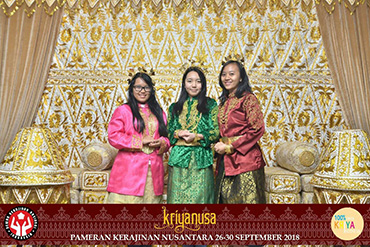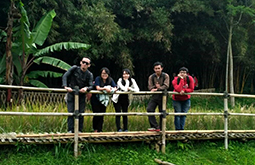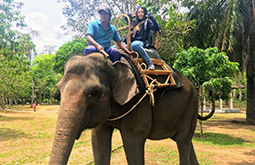Students wishing to study abroad from Akita University
Reports on study abroad experiences
Bandung Institute of Technology
(Indonesia)
AY2017
Exchange program Tobitate! Japan program
Shiho Monai
4th year,
Faculty of International Resource Sciences
Bandung Institute of Technology
(Indonesia)
Exchange program Tobitate! Japan program
Indonesian traditional costume
(I'm in the center)
At a local badminton club
(I'm third from the left)
At the Lembang Botanical Garden
(I'm in the center)
Yogyakarta
Elephant ride at Borobudur Temple
I studied for one year at a university in Indonesia called Bandung Institute of Technology. Bandung is located about three hours away from the capital city of Jakarta by train, and is the third largest city in Indonesia after Jakarta and Surabaya. At Bandung Institute of Technology, I belonged to two departments: one for business and management, and the other for energy resource development. There were many confusing moments as I went back and forth between the humanities and science departments, but I was blessed with friends who kindly supported me, and I was able to earn credits. I also did a three-month internship at a company that engages in geothermal development. This internship was a great experience for me because I learned about the management of geothermal development and the geothermal situation in Indonesia.
Before studying abroad, I heard that Indonesians couldn’t speak English as well as Japanese people. I was concerned that I wouldn’t be able to communicate with Indonesian people in English especially since I wasn’t even all that confident in my own English ability, and that I would most definitely not be able to speak in Indonesian even if I attempted to start learning the language right away. However, all the students at the university were able to have basic conversations in English. In fact, they were all much better than me. They tried their best to understand my poor English and helped me express myself in a more comprehensible way. Eventually, the fact that I was able to converse in English gave me confidence, and I began to use a variety of expressions. I also experimented with unfamiliar expressions. I became very good at English spoken by the Indonesians, thinking about how that girl used to say things like this, or how I could imitate the teacher’s way of speaking. Since neither Indonesians nor I were native English speakers, we rarely used complicated phrases, and our first priority was finding a way to communicate with the other person. I was grateful for this environment and it helped me to improve my English ability.
It is not inaccurate to say that Indonesians cannot speak English. When I stepped off-campus, there were more people who could only speak Indonesian. Therefore, I had to speak Indonesian with such people as waiters at restaurants and cafes and with cab drivers. I left Japan not being able to speak Indonesian at all, but with the help of my friends, I was able to learn the minimum amount of Indonesian that I needed in my day-to-day life. Now, I can take a cab and make small talk with the driver in Indonesian on the way to my destination. Once I was able to use the local language and no longer felt any inconvenience in my life, I began to feel at ease in the country of Indonesia. The fact that I was able to live in this country for a full year gave me more confidence than anything else.
Before studying abroad, I heard that Indonesians couldn’t speak English as well as Japanese people. I was concerned that I wouldn’t be able to communicate with Indonesian people in English especially since I wasn’t even all that confident in my own English ability, and that I would most definitely not be able to speak in Indonesian even if I attempted to start learning the language right away. However, all the students at the university were able to have basic conversations in English. In fact, they were all much better than me. They tried their best to understand my poor English and helped me express myself in a more comprehensible way. Eventually, the fact that I was able to converse in English gave me confidence, and I began to use a variety of expressions. I also experimented with unfamiliar expressions. I became very good at English spoken by the Indonesians, thinking about how that girl used to say things like this, or how I could imitate the teacher’s way of speaking. Since neither Indonesians nor I were native English speakers, we rarely used complicated phrases, and our first priority was finding a way to communicate with the other person. I was grateful for this environment and it helped me to improve my English ability.
It is not inaccurate to say that Indonesians cannot speak English. When I stepped off-campus, there were more people who could only speak Indonesian. Therefore, I had to speak Indonesian with such people as waiters at restaurants and cafes and with cab drivers. I left Japan not being able to speak Indonesian at all, but with the help of my friends, I was able to learn the minimum amount of Indonesian that I needed in my day-to-day life. Now, I can take a cab and make small talk with the driver in Indonesian on the way to my destination. Once I was able to use the local language and no longer felt any inconvenience in my life, I began to feel at ease in the country of Indonesia. The fact that I was able to live in this country for a full year gave me more confidence than anything else.






